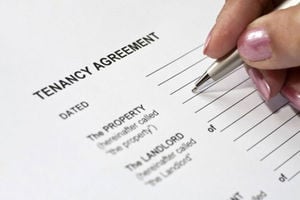
Many tenants that live close to or share premises with their landlords report report intrusive behaviour from their landlords. PHOTOs/unsplash.com.
About two weeks ago, Racheal Agaba, received a WhatsApp message from her landlord detailing a new set of rules. Having been in the single self-contained studio for four years, Agaba was shocked by the tone of the new rules.
“I am not stopping you from having visitors but I do not want the visits to be discreet. I have no problem with women. They can even spend the night, but not men. As your visitors come for studies or consultation, let me know in advance. They should come earlier in the day or afternoon and leave early, not late in the night,” stated one of the rules.
“When inside, do not lock the door or completely cover the door with a curtain. Let it be known that you have a visitor and you are not hiding anything. You should feel safe, watching your doorway will have nothing to mean that you are being monitored, it is just not easy to control the eyes,” read rule number two.
“I do not expect a man to sleep over in your house. I have no problem with visitors as long as they do not come frequently. If you have a meeting or party, just let me know where you are going and when you are likely to come back,” read rule number three.
“If you are with your friends and we bump into each other, do not ignore me; greet me, and if you can, briefly introduce them to me as your landlord,” read rule four.
“If you need me to drop or pick you up, let me know. Remember, if anything happens to you, your parents are likely to contact me as the nearest person to you. Inform your visitors in advance about the rules. You do not need to say that the landlord instructed you, but they must follow the rules,” read the last set of rules.
Agaba says she was shocked by how patronising the rules were. She also remembers another incident where one of the tenants was evicted because he was in an unstable relationship.
Growing concern
Three weeks ago, KFM presenter, Faiza Salma also shared an experience where a potential landlord in Bugolobi, a Kampala suburb, only wants absentee tenants.
Similarly, during house hunting, Theo Astar narrated how one landlady says she does not want tenants with more than one child. However, she does not mind children that were born on the premises.
Why are property owners going overboard with their rules?
Nuru Ashaka, a property owner argues that most landlords are coming up with all kinds of funny rules primarily to protect their property from damage. For example, if a single woman brings in male visitors or a male visitor has many female visitors, there is a risk of having fights if the situation is not well handled by the tenant.
Similarly, when the landlord prefers single tenants without children, they want to protect their property because there is a difference in terms of property degradation between a property where children live and one occupied by a single tenant or couple without children.
“But if the landlord’s rules undermine your rights, speak up. Ask why they are introducing new rules. There are some rules landlords introduce deliberately to evict their tenants,” Ashaka says.
What the law says
Stuart Oramire, a lawyer explains that property tenancy culminates from the contractual relationship with your landlord. What you include in the terms and conditions of a contract, which is the tenancy agreement, determines how you live with your landlord.
However, the tenancy agreement should be informed from and by the law, which is the Landlord and Tenant Act 2022. Whereas your relationship with the landlord should be governed by the contractual obligation reduced into a tenancy agreement, the tenancy agreement should be formed from the law, and any contract that falls outside the law is void.
“When you are given terms and conditions of tenancy or occupancy of a property and you do not agree with them, you can leave. But when you have occupied their premises, you are supposed to be governed by a contractual arrangement or obligation developed from the Landlord and Tenant Act 2022,” Oramire guides.
In Agaba’s case where the landlord wants her to leave the door when she has visitors, it abuses the landlord and tenancy contract if it was not agreed upon at the start of the occupancy. Once you occupy the landlord’s premises, you are supposed to enjoy peaceful possession of the property, free from the landlord’s interference.
“When the landlord starts wanting you to inform them of your absence or otherwise, it means they are violating your rights to occupy premises in a manner that is peaceful. When you are someone’s tenant, you are not their child and neither are they your boss. You are paying them and the return of that money or consideration is called rent. The landlord cannot evict at their whim because they are governed by law and you can challenge it in court,” Oramire states.
The tenancy agreement
Legally, the provisions and clauses of the tenancy agreement you discuss with the landlord must conform with the provisions of the Landlord and Tenants Act 2022. The provisions of the law are such that you (tenant) and the landlord have rights.
None of these rights are supposed to violate the rights of the tenant. None of the provisions of the Landlord and Tenant Act 2022 give the landlord rights to decide how you operate on the premises, who you bring to your house, or notify them of your absence. However, there is the security consideration that you need to be careful who you invite to your premises for the sake of other people’s peace.
Anything beyond the tenancy agreement, verbal or written from the landlord that infringes on your right to enjoy vacant and peaceful possession of your tenancy is a violation of your rights.
“If the capacity of the house can accommodate two people, it has to be discussed clearly before occupancy because more than two people could be a burden on the property, which may cause some inconveniences or damages. But when you occupy premises, it means you and the landlord have terms and conditions that govern the relationship whether the agreement is written or verbal,” Oramire says.
The law presupposes that by the time you occupy your premises, all the rights that accrue to the tenant are there. Once you have occupied the premises, the landlord cannot turn around and increase rent or ask you to vacate the premises because you have had a child.
However, if a child inconveniences other tenants, the landlord or damages the premises when both parties agreed to a no-child clause, then you are in violation of your contract and the landlord has a right to evict you.
The law
The provisions and clauses of the tenancy agreement you discuss with the landlord must conform with the provisions of the Landlord and Tenants Act 2022. The provisions of the law are such that you (tenant) and the landlord have rights.
None of these rights are supposed to violate the rights of the tenant. None of the provisions of the Landlord and Tenant Act 2022 give the landlord rights to decide how you live.




